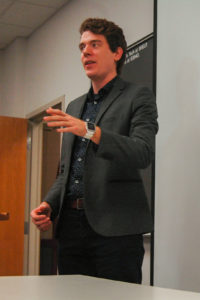Andrew McGill, a senior associate editor at The Atlantic, said a picture is worth a thousand words in journalism.
He spoke about the rise and importance of data journalism and visualization Dec. 2 in Coppee 101.

Andrew McGill presents “A Picture, a graphic, or a Video Game Is Worth a Thousand Words: Using Data to Tell Stories” Friday afternoon, Dec. 2, 2016, in Coppee Hall. McGill discussed the increasing need for images and data to support storytelling in today’s day and age. (Grace Rountry/B&W Staff)
McGill said he fell into data journalism. He didn’t plan on being a data journalist right out of college and the profession came to him through skills he acquired throughout childhood and adolescence. In middle school, McGill loved to code. He went to coding classes and developed broad knowledge on the subject.
After graduating from Penn State, McGill worked for the The Morning Call, where he was assigned to write stories about crimes in the local area. His position required him to look through public records to find newsworthy stories, which could take hours to do. McGill used his coding skills to write a program using “R” to help him sort through records to find stories.
His colleagues saw how proficient he was in compiling and sorting through data, which led him to become a data journalist and move on to new jobs in the field.
McGill emphasized the importance of using graphs and other visualization tools for more effective storytelling.
“Sometimes having a picture for the reader to look at tells so much more than a story being written,” McGill said. “You can have a graph that will take the reader two seconds to comprehend versus a long paragraph on the same subject that the reader will skim through and will pick up barely any information on.”
McGill said journalists should be somewhat familiar with the basics of compiling data and making simple graphs, but does not think all journalists need to know how to code.
“If you like coding, learn it,” McGill said. “If not, don’t waste your time because you’re just going to be bored and hate your job.”
McGill said clarity, accuracy and surprise are the three things that make a news story great. He also advised students to make the information they compile and the calculations they do public. This way, readers can check for validity.
McGill stressed that every good news story should have a surprise. Surprise interests readers and makes them continue reading.
Haiyan Jia, an assistant professor of journalism and communication, organized the talk with McGill. Jia recently came to Lehigh to teach data-driven journalism classes.
When the semester started, Jia looked online to learn about similar classes taught at other universities and discovered that McGill teaches one at her alma mater, Penn State.
Jia reached out to McGill to find out what teaching strategies have worked for him and what angles he uses in his classes. She thought it would be useful to have him come talk to students and faculty on what data journalism is, how to implement it in writing and where it might be going in the future.
“I am taking a journalism class next semester and had never heard of data journalism before,” Leanna Gallagher, ’19, said. “I asked my brother at Vanderbilt about it, and he said it had to do something with coding. I decided to go to the speech to hear more about it and to see if this would be something I would be interested in pursuing in the future.”





Comment policy
Comments posted to The Brown and White website are reviewed by a moderator before being approved. Incendiary speech or harassing language, including comments targeted at individuals, may be deemed unacceptable and not published. Spam and other soliciting will also be declined.
The Brown and White also reserves the right to not publish entirely anonymous comments.